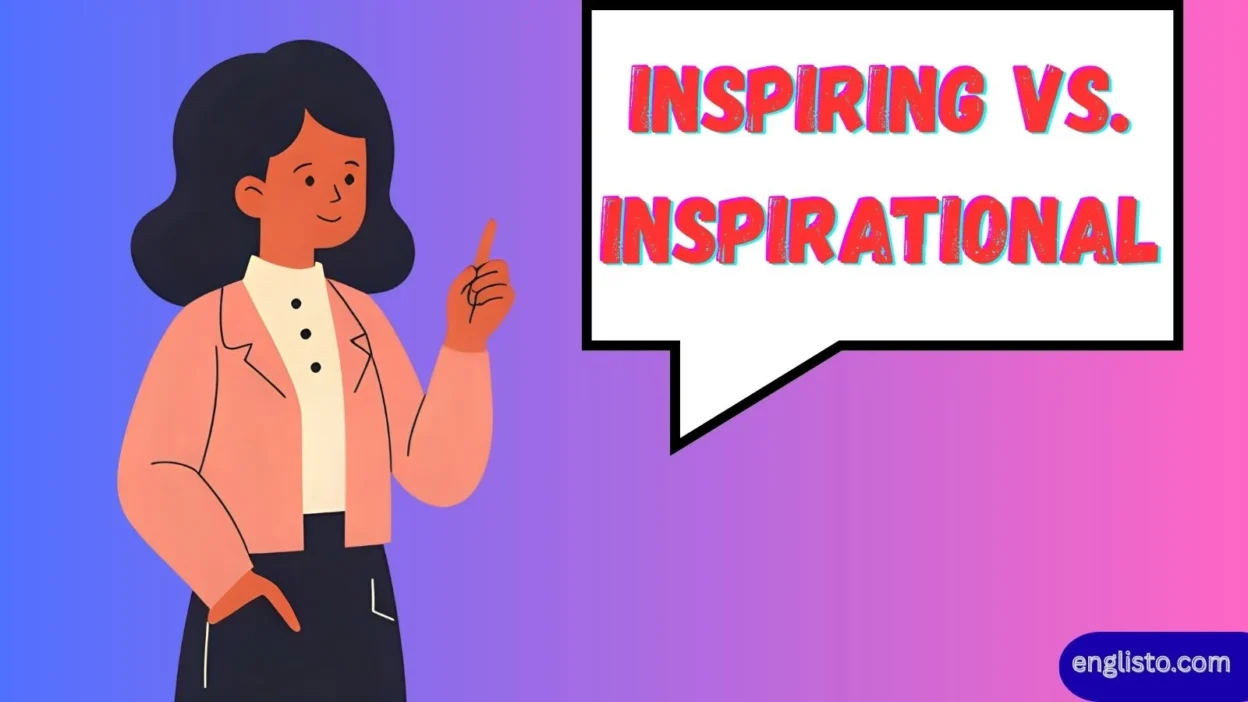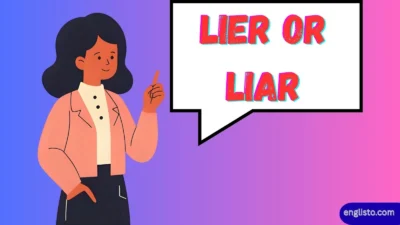Language has a curious way of shaping our thoughts. Some words look almost identical but carry subtle shades of meaning that change the way we communicate. A great example is the pair “inspiring” vs “inspirational.”
At first glance, they seem interchangeable. After all, both suggest something uplifting, motivating, or capable of sparking positive feelings. But when you scratch beneath the surface, you’ll find that each word carries unique nuances, contexts, and emotional tones that matter in writing, speech, and everyday conversations.
This article will break down the differences between inspiring and inspirational using real-life examples, grammar insights, synonyms, comparisons, and storytelling. By the end, you’ll know exactly when to use each word with clarity, confidence, and precision.
What Do “Inspiring” and “Inspirational” Mean?
Both words stem from the root inspiration, which traces back to the Latin inspirare—meaning to breathe into. In essence, they describe something that sparks hope, courage, or creativity. But the nuance lies in intention and effect.
| Word | Core Meaning | Example | Emotional Tone | Usage Context |
| Inspiring | Something that actively stirs strong feelings or incites action in the moment. | The teacher’s story about resilience was inspiring. | Raw, spontaneous, personal | Experiences, moments, people, actions |
| Inspirational | Something designed, structured, or presented to provide motivation or encouragement. | She gave an inspirational speech at the graduation ceremony. | Polished, deliberate, uplifting | Speeches, books, movies, content, structured messages |
Think of inspiring as the spark that naturally ignites emotion, while inspirational is the crafted torch meant to light the way for others.
Read More: Is It Correct to Say “Fellow Colleagues”?
Inspiring: A Natural, Spontaneous Spark
When something is inspiring, it has a transformative effect on you in the moment. It might not be intentional. A sunset, a stranger’s kindness, or even a piece of art can leave you with goosebumps or ignite a new idea.
Characteristics of “Inspiring”
- Spontaneous – It happens without design or planning.
- Personal – It hits individuals differently based on their own context.
- Emotional impact – Often stirs feelings of awe, courage, or creativity.
- Incites action – Can push someone to take a leap or change direction.
Examples of inspiring situations:
- An inspiring mentor guiding students through challenges.
- An inspiring landscape like the Grand Canyon making someone rethink their place in the world.
- An inspiring teacher turning setbacks into lessons of courage.
- An inspiring painting that provokes thought and sparks creativity.
Quote: “Our chief want is someone who will inspire us to be what we know we could be.” – Ralph Waldo Emerson
Inspirational: Intentional Messages of Motivation
By contrast, inspirational often refers to something crafted to encourage or deliberately designed to motivate. Books, speeches, motivational posters, and movies fall into this category.
Characteristics of “Inspirational”
- Intentionality – Aimed at audiences with motivational clarity.
- Structured – Often well-thought-out and polished.
- Encouraging – Provides hope and direction.
- Broad reach – Meant to resonate with groups or communities.
Examples of inspirational content:
- An inspirational speech at a graduation ceremony.
- An inspirational book like Brene Brown’s Daring Greatly.
- An inspirational movie such as The Pursuit of Happyness.
- An inspirational poster with a quote reminding employees of teamwork.
Quote: “The only limit to our realization of tomorrow will be our doubts of today.” – Franklin D. Roosevelt
Key Distinctions Between Inspiring and Inspirational
| Aspect | Inspiring | Inspirational |
| Source | Spontaneous, organic | Crafted, deliberate |
| Focus | Individuals, experiences, nature, people | Messages, speeches, content, works |
| Effect | Evokes emotion, sparks action | Encourages reflection, gives hope |
| Tone | Raw, personal, unintentional | Polished, motivating, intentional |
| Examples | Teacher, role model, volunteer | Book, speech, movie, program |
Simple test: If it feels like a natural spark → inspiring. If it’s designed to motivate → inspirational.
Real-Life Examples and Scenarios
Let’s bring these words to life with everyday situations:
- Scenario 1 (Inspiring): You volunteer at a homeless shelter and watch an employee’s dedication to helping others. You walk away with courage to give back more. That’s inspiring.
- Scenario 2 (Inspirational): You attend a motivational seminar where the speaker uses stories, strategies, and eloquence to lift the crowd. That’s inspirational.
- Scenario 3 (Inspiring): A painting in an art gallery evokes deep emotions and makes you want to pick up a brush yourself.
- Scenario 4 (Inspirational): A self-help book lays out clear steps for overcoming adversity and building resilience.
Synonyms, Antonyms, and Related Words
| Inspiring | Inspirational |
| Uplifting | Motivating |
| Moving | Encouraging |
| Stirring | Hopeful |
| Provocative | Purposeful |
| Empowering | Motivational |
Antonyms: discouraging, depressing, disheartening, unmotivating.
Grammar and Usage Notes
Both words are adjectives, but they differ in nuance and tone.
- Inspiring is often used with people, events, or natural phenomena:
- She’s an inspiring leader.
- That sunset was inspiring.
- She’s an inspiring leader.
- Inspirational is commonly used with content, works, or structured efforts:
- He wrote an inspirational book.
- They delivered an inspirational speech.
- He wrote an inspirational book.
Pro tip: Dictionaries like the Cambridge Dictionary note both words as synonyms, but real-life usage favors this subtle distinction.
Emotional Impact and Audience Response
One reason these words confuse learners is because both deal with emotions and motivation.
- Inspiring → evokes a personal emotional spark.
- Inspirational → provides a broader motivational message meant for an audience.
This matters in communication:
- If you’re writing about personal experiences, use inspiring.
- If you’re delivering structured encouragement, use inspirational.
When to Choose Inspiring vs. Inspirational
| Context | Best Choice | Example |
| Describing a person | Inspiring | She’s an inspiring coach who motivates her team every day. |
| Describing a speech or book | Inspirational | The inspirational talk left the audience energized. |
| Talking about nature or art | Inspiring | The hike through the mountains was inspiring. |
| Referring to motivational design | Inspirational | The inspirational poster hung in the office lobby. |
| Everyday encouragement | Inspiring | His courage during adversity was inspiring. |
The Power of Stories: Inspiring vs. Inspirational Narratives
Stories illustrate the subtlety best.
- Inspiring narrative: A young man overcomes adversity by working two jobs to pay for college. His grit ignites hope in those around him.
- Inspirational narrative: A book written about his journey, crafted to motivate thousands of readers facing financial struggles.
Common Mistakes Learners Make
- Using them interchangeably in formal writing – While casual conversation allows overlap, precise writing benefits from distinction.
- Overusing inspirational – Sometimes inspiring feels more natural and personal.
- Forgetting emotional nuance – Inspiring carries spontaneity, inspirational carries intent.
FAQs
Q1: Are “inspiring” and “inspirational” synonyms?
Not exactly. They overlap but differ in nuance: inspiring is personal and spontaneous, while inspirational is intentional and structured.
Q2: Can a person be inspirational?
Yes, but usually if their life story, speeches, or actions are shared broadly. Someone you personally admire may feel inspiring to you.
Q3: Is one word stronger than the other?
Not stronger—just different. Inspiring feels raw and emotional; inspirational feels polished and motivational.
Q4: How do dictionaries define them?
According to the Cambridge Dictionary:
- Inspiring → making you feel excited about something.
- Inspirational → making you feel full of hope or encouraged.
Q5: Can something be both inspiring and inspirational?
Absolutely. A speech can be inspiring in the moment and also inspirational in its crafted design.
Conclusion
Choosing between “inspiring” vs. “inspirational” may seem like splitting hairs, but words carry power.
- Use inspiring when describing spontaneous sparks of emotion—a role model, a sunset, a courageous act.
- Use inspirational when referring to intentional messages of motivation—a speech, a book, a poster.
By understanding this distinction, your communication gains clarity, emotional resonance, and precision. Whether you’re writing, speaking, or simply appreciating the beauty of life, knowing when to use these words will make your expression more powerful and relatable.



